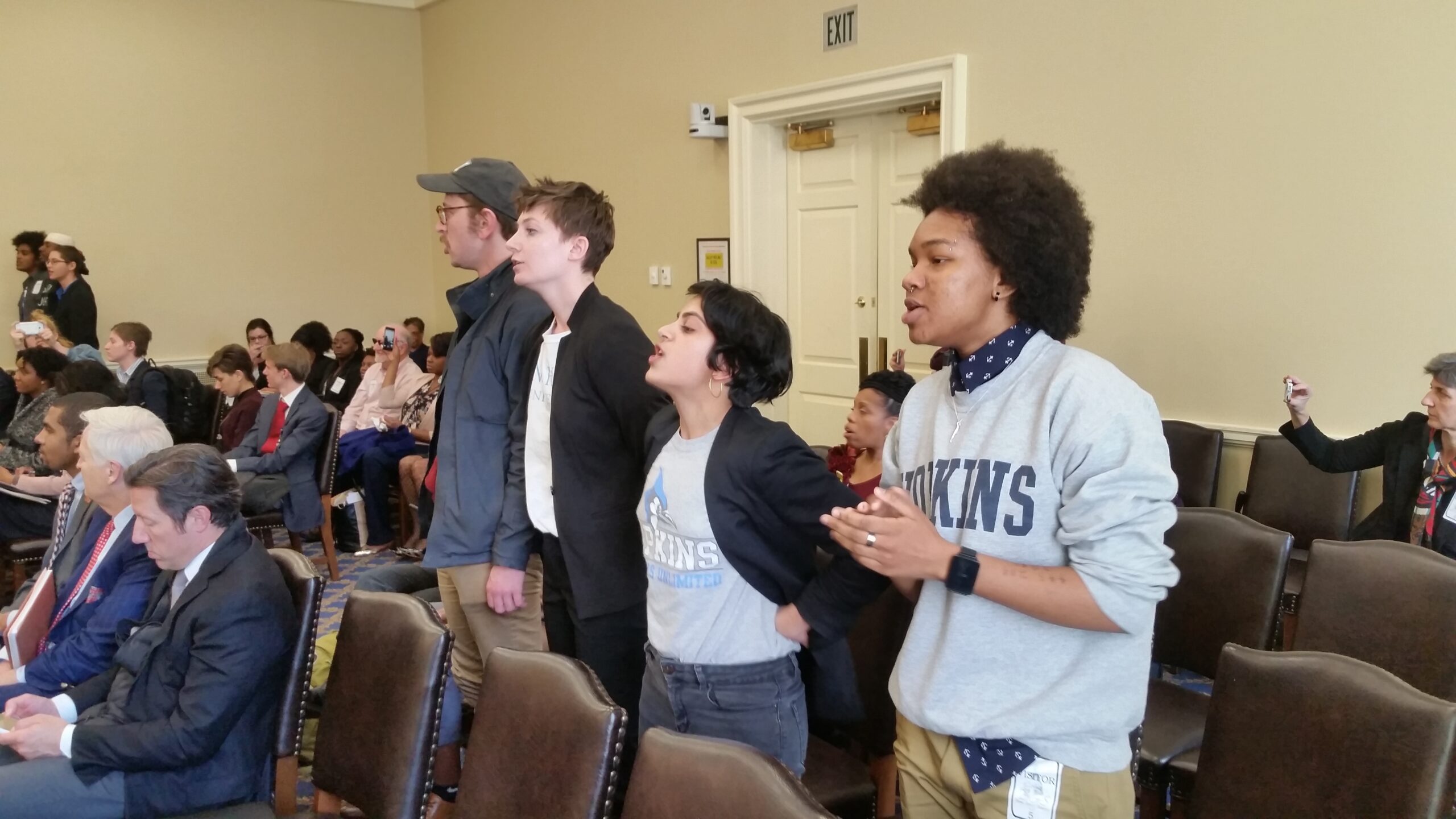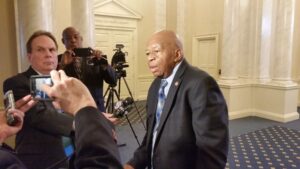
Even as legislation allowing Johns Hopkins University to establish a private police force marches slowly toward what feels like inevitable passage, it remains an emotional and explosive topic in the State House.
On Tuesday, U.S. Rep. Elijah E. Cummings (D-Md.) made a surprise appearance in Annapolis as the Baltimore City House Delegation met to consider the Hopkins bill and then delivered an impassioned plea on behalf of the measure.
“I just can’t ask you,” he said, calling out individual lawmakers by name. “I’ve come to beg you to do something.”
Cummings delivered his appeal in dramatically personal terms – talking about his 20-year-old nephew, who was murdered on the campus of Old Dominion University in Norfolk, Va. (“I saw his brains splattered on the sidewalk”) and about the months he’s spent recuperating at Johns Hopkins Hospital in Baltimore from various ailments in recent years.
“There’s a lot of riff-raff in there,” he said.
Cummings said that at a time when Baltimore is wracked by violent crime, the city, and Hopkins, its leading private institution, would benefit from a special police force patrolling the Homewood campus, the hospital grounds, and the Peabody Institute.
“Sometimes I hear that Hopkins gets everything they want,” Cummings said. “It ain’t about that! It’s about life and death!”
As Cummings got up to leave – his appearance in Annapolis was unscheduled and he said he decided to show up without conferring with Hopkins administrators – Del. Maggie L. McIntosh (D), who represents the Homewood campus area and had been called out twice by the congressman during his appeal, referenced his work on Capitol Hill as chair of the House Oversight and Reform Committee.

U.S. Rep. Elijah E. Cummings (D) speaks to reporters in Annapolis Tuesday after addressing the Baltimore City House delegation. Photo by Josh Kurtz
“Thank you for the work you do,” McIntosh said. “You are saving the country.”
Then it came time for the city delegation to turn to more prosaic matters – possible amendments to the Hopkins bill. The delegates decided to adopt the amendments that the Senate Judicial Proceedings Committee added to the legislation, so the House and Senate versions of the bill would be in the same posture. The delegation then rejected amendments offered by Del. Brooke E. Lierman (D) and Del. Nick J. Mosby (D). One of Mosby’s amendments would have set up a fund to eradicate lead paint from buildings in the city.
When the delegation prepared to vote on the overall legislation, seven protesters who had been sitting in the audience jumped up and started chanting, “No justice, no peace/No private police!” Because there were no police officers in the room, the demonstrators continued chanting for a full three minutes, as Del. Talmadge Branch (D) left the room to find a police officer. The officer led the protesters out of the committee room and out onto the street as three police cars zoomed to the scene.
The bill passed through the delegation by a vote of 9-4. In addition to Branch, Lierman and McIntosh, voting for it were Dels. Curtis S. Anderson, Dalya Attar, Frank Conaway, Cheryl Glenn, Keith Haynes and Samuel I. Rosenberg. Voting against were Mosby and Dels. Regina Boyce, Robbyn Lewis and Melissa Wells. Dels. Luke V. Clippinger and Stephanie Smith were absent, and Del. Tony Bridges recused himself because he works for Hopkins.
The delegation vote was technically advisory; the Hopkins legislation is not a local bill and is officially in jurisdiction of the House Judiciary Committee.
Meanwhile, the bill was supposed to be debated on the Senate floor Tuesday afternoon, but that was put off for a day. Even so, emotions were raw.
Before the debate was delayed, state Sens. Mary L. Washington (D-Baltimore City) and Jill P. Carter (D-Baltimore City) rose to speak. Senate President Thomas V. Mike Miller Jr. (D-Prince George’s) noted that since both freshman senators serve on the Judicial Proceedings Committee, which has already debated and amended the legislation, they should not spend much time discussing the bill on the floor.
“You’re both new to the Senate, and that’s great,” Miller said. “But just remember that the bill came out of your committee.”
Carter then moved to delay debate. But Washington got up to speak anyway.
She thanked Miller for his career-long support for Baltimore and for fretting about violent crime in the city. She thanked Judicial Proceedings Chair Robert A. Zirkin (D-Baltimore County) for allowing freewheeling debate in the committee room. She said Baltimore City Senate Delegation Chair Antonio L. Hayes (D) – with whom she clashed when the delegation was discussing the legislation last week – “has done a lot to defend our city.”
She assured her colleagues that she was not just trying to delay the process by speaking out. Miller then suggested that Washington reserve her remarks for the following day, when debate on the bill would resume. Washington reluctantly agreed.
“I understand you have the votes to pass this,” she said.




 Creative Commons Attribution
Creative Commons Attribution